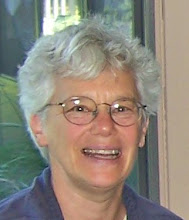
How did I do it when I was working 60-hour weeks and trying to have a life? Over the past six weeks I got very busy—well, “very” is relative, but I did help my son roof a cabin, set up a website for the Authentic Movement Community, have houseguests, submit a manuscript to my writing group, join a dance group of differently-abled people, and do some of my own writing. All good things.
Now I’m making the transition back to “my own time.” It’s hard to describe the difference. It’s not like I do nothing, but I have the sense of doing nothing. It’s not like I have endless time, but I attempt to treat it as endless. I stop the lists running in my head (I have one on the kitchen counter for the basics). I notice that voice that keeps asking “What next?” and “What should I be doing?” “Nothing,” I answer the voice.
“Shouldn’t you check email?” “It will wait.”
“Shouldn’t you do errands?” “They can keep.”
I spend time looking out the window at the branches waving in the wind. I suddenly have ideas for three poems—now those are worth the time! I take a walk. I make tea. I write this essay. Tomorrow is a busy day but I have three days in a row after that with no fixed points. What luxury!
Technorati tags: retirement, leisure, meditation

